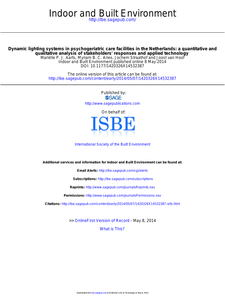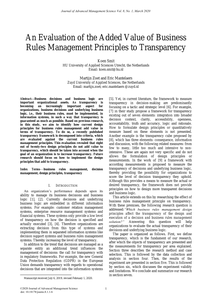From the article: "This article evaluates the application of blockchain technology to improve organic or fair-trade food traceability from “Farm to Fork” in light of European regulations. This study aims to shed light on the challenges in the organic food chain to overcome, the drivers for blockchain technology, and the challenges in current projects."
DOCUMENT

From the article: Abstract Since more and more business rules management solutions are utilized, organizations search for guidance to design such solutions. Principles are often applied to guide the design of information systems in general. Scientific research on principles for business rules management is limited. The purpose of this paper is to specify, classify, and validate design principles that can be applied to guide the design of a business rules management solution. We conducted a three round focus group and three round Delphi Study, which led to the identification of 22 principles. These 22 principles can be clustered into four categories: 1) deep structure principles, 2) physical structure principles, 3) surface structure principles, and 4) organizational structure principles. Our results provide a framework for the design and analysis of business rules management solutions.
LINK
Purpose – In the domain of healthcare, both process efficiency and the quality of care can be improved through the use of dedicated pervasive technologies. Among these applications are so-called real-time location systems (RTLS). Such systems are designed to determine and monitor the location of assets and people in real time through the use of wireless sensor networks. Numerous commercially available RTLS are used in hospital settings. The nursing home is a relatively unexplored context for the application of RTLS and offers opportunities and challenges for future applications. The paper aims to discuss these issues. Design/methodology/approach – This paper sets out to provide an overview of general applications and technologies of RTLS. Thereafter, it describes the specific healthcare applications of RTLS, including asset tracking, patient tracking and personnel tracking. These overviews are followed by a forecast of the implementation of RTLS in nursing homes in terms of opportunities and challenges. Findings – By comparing the nursing home to the hospital, the RTLS applications for the nursing home context that are most promising are asset tracking of expensive goods owned by the nursing home in orderto facilitate workflow and maximise financial resources, and asset tracking of personal belongings that may get lost due to dementia. Originality/value – This paper is the first to provide an overview of potential application of RTLS technologies for nursing homes. The paper described a number of potential problem areas that can be addressed by RTLS. Published by Emerald Publishing Limited Original article: https://doi.org/10.1108/JET-11-2017-0046 For this paper Joost van Hoof received the Highly Recommended Award from Emerald Publishing Ltd. in October 2019: https://www.emeraldgrouppublishing.com/authors/literati/awards.htm?year=2019
MULTIFILE

Fluidity models in the supply chain privilege the sustainable integration of capabilities and collaboration among its members in order to guarantee an efficient and safe flow of resources throughout all its processes. This research proposes a fluidity model for the agroindustry supply chain as a solution with regard to the sector’s needs of supply chain processes, and opportunities to collaborate within the field of innovation and sustainability through of traceability and proactive risk management as a tool for creating resilient systems. The model is based on a holistic vision that will allow it to adapt to an ever more complex and continuously transformed global environment that demands solutions to assess the global impact of local decision-making in the supply chain over a period of time, considering its implications and contributions to the agroindustry and agro-logistics sector. Finally, pertinent research areas are identified in the integration of agroindustry supply chain echelons.
DOCUMENT
Long-term care facilities are currently installing dynamic lighting systems with the aim to improve the well-being and behaviour of residents with dementia. The aim of this study was to investigate the implementation of dynamic lighting systems from the perspective of stakeholders and the performance of the technology. Therefore, a questionnaire survey was conducted with the management and care professionals of six care facilities. Moreover, light measurements were conducted in order to describe the exposure of residents to lighting. The results showed that the main reason for purchasing dynamic lighting systems lied in the assumption that the well-being and day/night rhythmicity of residents could be improved. The majority of care professionals were not aware of the reasons why dynamic lighting systems were installed. Despite positive subjective ratings of the dynamic lighting systems, no data were collected by the organizations to evaluate the effectiveness of the lighting. Although the care professionals stated that they did not see any large positive effects of the dynamic lighting systems on the residents and their own work situation, the majority appreciated the dynamic lighting systems more than the old situation. The light values measured in the care facilities did not exceed the minimum threshold values reported in the literature. Therefore, it seems illogical that the dynamic lighting systems installed in the researched care facilities will have any positive health effects.
DOCUMENT

The past two years I have conducted an extensive literature and tool review to answer the question: “What should software engineers learn about building production-ready machine learning systems?”. During my research I noted that because the discipline of building production-ready machine learning systems is so new, it is not so easy to get the terminology straight. People write about it from different perspectives and backgrounds and have not yet found each other to join forces. At the same time the field is moving fast and far from mature. My focus on material that is ready to be used with our bachelor level students (applied software engineers, profession-oriented education), helped me to consolidate everything I have found into a body of knowledge for building production-ready machine learning (ML) systems. In this post I will first define the discipline and introduce the terminology for AI engineering and MLOps.
LINK
Dit artikel beschrijft onderzoek naar de rol die Enterprise Architectuur kan hebben bij het verduurzamen van een organisatie van hoger onderwijs. Hierbij zijn de volgende producten opgeleverd: - Een overzicht van relevante literatuur met betrekking tot Enterprise Architectuur en Duurzaamheid. - Een overzicht van de rol die Enterprise Architectuur speelt in geselecteerde organisaties en instellingen voor Hoger Onderwijs. - Een validatie van de beschreven ‘best practices’. - Lesmateriaal over de rol van Enterprise Architectuur en Duurzaamheid. Uit het onderzoek blijkt dat de rol van Enterprise Architectuur bij het behalen van duurzaamheidsdoelstellingen op dit ogenblik nog gering is. Wel zien de geïnterviewde architecten en duurzaamheidscoördinatoren op termijn een grotere rol weggelegd voor Enterprise Architectuur.
DOCUMENT

The Circular Wood 4.0 Workflow API is a comprehensive and automated “file-to-factory” system that bridges the gap between design using waste wood resources and production processes aligned with Smart Industry principles. This software serves as the core IT infrastructure for an end-to-end automated workflow, enabling seamless data flow from material availability to final production. Key features include full traceability, real-time process monitoring, and integration of design and manufacturing stages. The API is composed of several interconnected components that manage the entire workflow, from intelligent resource matching and design generation to production preparation and execution; facilitating efficient, sustainable, and transparent fabrication processes.
LINK
Business decisions and business logic are important organizational assets. As transparency is becoming an increasingly important aspect for organizations, business decisions and underlying business logic, i.e., their business rules, must be implemented, in information systems, in such a way that transparency is guaranteed as much as possible. Based on previous research, in this study, we aim to identify how current design principles for business rules management add value in terms of transparency. To do so, a recently published transparency framework is decomposed into criteria, which are evaluated against the current business rules management principles. This evaluation revealed that eight out of twenty-two design principles do not add value to transparency, which should be taken into account when the goal of an organization is to increase transparency. Future research should focus on how to implement the design principles that add to transparency.
DOCUMENT

The goal of a local energy community (LEC) is to create a more sustainable, resilient, and efficient energy system by reducing dependence on centralized power sources and enabling greater participation and control by local communities and individuals. LEC requires transformations in local energy systems, and strongly depends on the preferences and actions of the local actors involved. The necessity for extensive stakeholder involvement adds complexity to the energy transition, posing a significant challenge for all involved parties. The municipality of Leidschendam-Voorburg has committed to the national decision for energy transition. It has taken a strategic approach by proceeding De Heuvel/Amstelwijk as the pioneer in this initiative, leading the way for other neighborhoods to follow. It is crucial to devise strategies that effectively facilitate stakeholder engagement. To this end, a thorough stakeholder analysis is needed. Such an analysis can focus on the identification of key stakeholders, their interests, their influence, and their behavioral characteristics in relation to the energy transition. Additionally, it's crucial to uncover the challenges encountered by these stakeholders and finally develop appropriate strategies to address them hence enhance their engagement. This thesis begins with an introduction to the research background, including a presentation of the case study and a statement of the problem identified in the field, followed by the research questions underpinning the study. A thorough literature review ensues, providing a robust synthesis of existing research relating to stakeholder engagement in LECs, with a view to expediting energy transitions. The literature review not only forms the foundation for the research methods adopted in this study but also promotes in the construction of the conceptual model. Subsequent to the literature review, the research method is detailed. The filed research is conducted in five steps: Step 1 - identification of stakeholders, Step 2 - prioritization of stakeholders, Step 3 - interviewing, Step 4 - data analysis, including stakeholder profiling with mapping and addressing challenges, and finally, Step 5 - proposal of strategies for stakeholder engagement enhancement based on the expected and current levels of stakeholders engagement. This research collects necessary information to understand the profiles of stakeholders in De Heuvel/Amstelwijk, tackle challenges faced by different stakeholders, propose strategies to increase stakeholders engagement. It not only aims to enrich the depth of theoretical knowledge on the subject matter but also strives to aid in the development of a localized energy strategy that is optimally suited for the De Heuvel/Amstelwijk neighborhood as good example for other neighborhoods.
DOCUMENT
